Me subo al tobogán. Sí, yo, con mi bata de neuróloga aún colgando del hombro, con mis versos amontonados en la libreta del bolsillo. La mirada de sorpresa de los niños me divierte: ¿Los adultos también resbalan? Al deslizarme, por un segundo, vuelvo a tener cinco años.
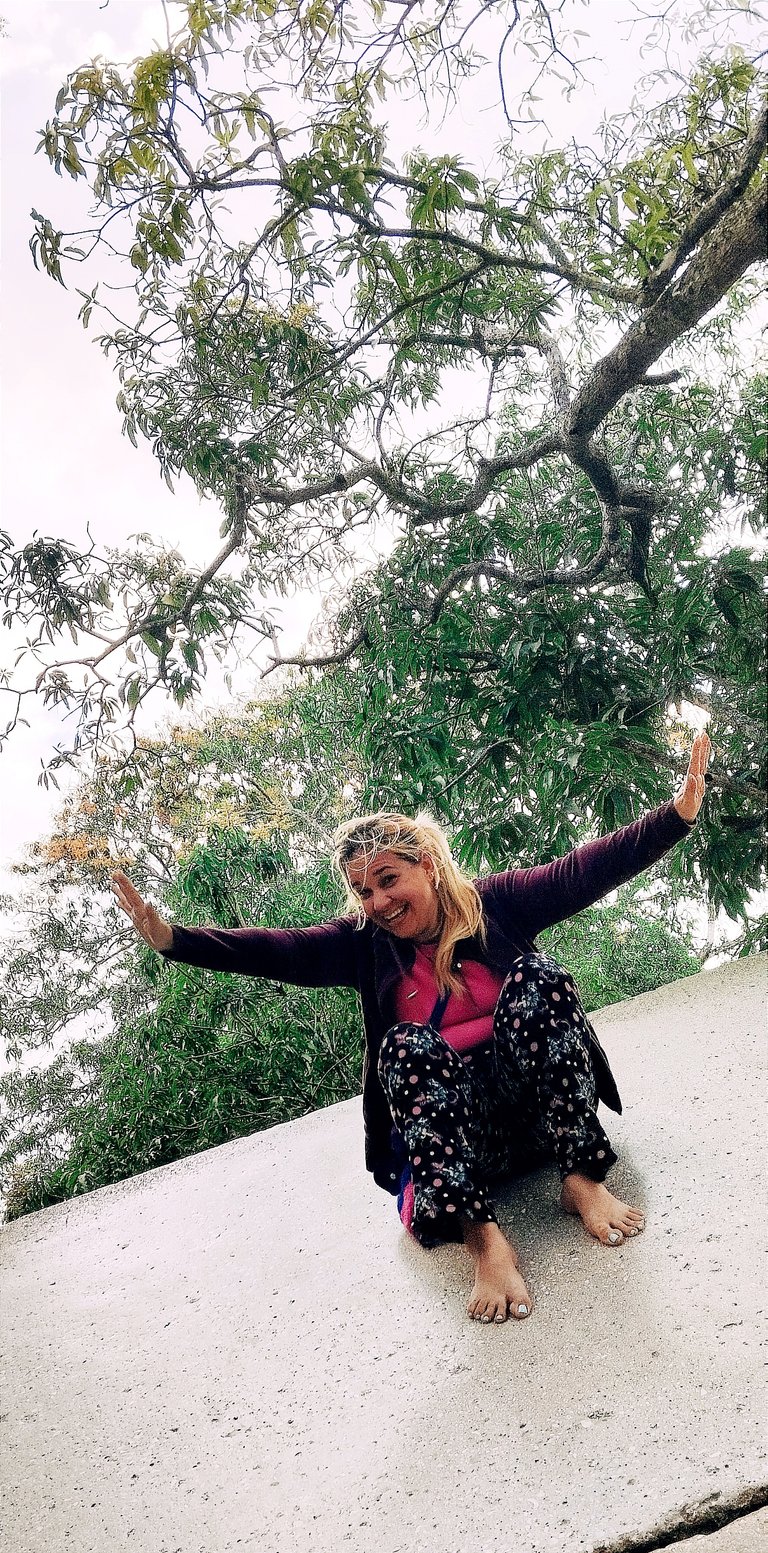
Como poeta, sé que las metáforas más genuinas nacen del asombro, y como médica neuróloga, he visto cómo el juego reconfigura cerebros: en la plasticidad neuronal de mis pacientes con demencia que recuperan destellos de memoria al apretar un peluche, o en el paciente con secuelas de un ictus que juega con una pelota de goma hasta recuperar la fuerza muscular deseada. Veo a menudo cómo los niños con autismo encuentran puentes al mundo a través de los juegos. Y como madre, aprendo cada día que mi hija me enseña más cuando jugamos que cuando le doy lecciones.
En neurología hay un concepto hermoso: reserva cognitiva. Cuanto más flexible sea tu cerebro, más resistirá el paso del tiempo, y nada entrena mejor esa flexibilidad que el juego. No es casualidad que los estudios muestren que los adultos que mantienen hábitos lúdicos tengan menos riesgo de depresión o Alzheimer.
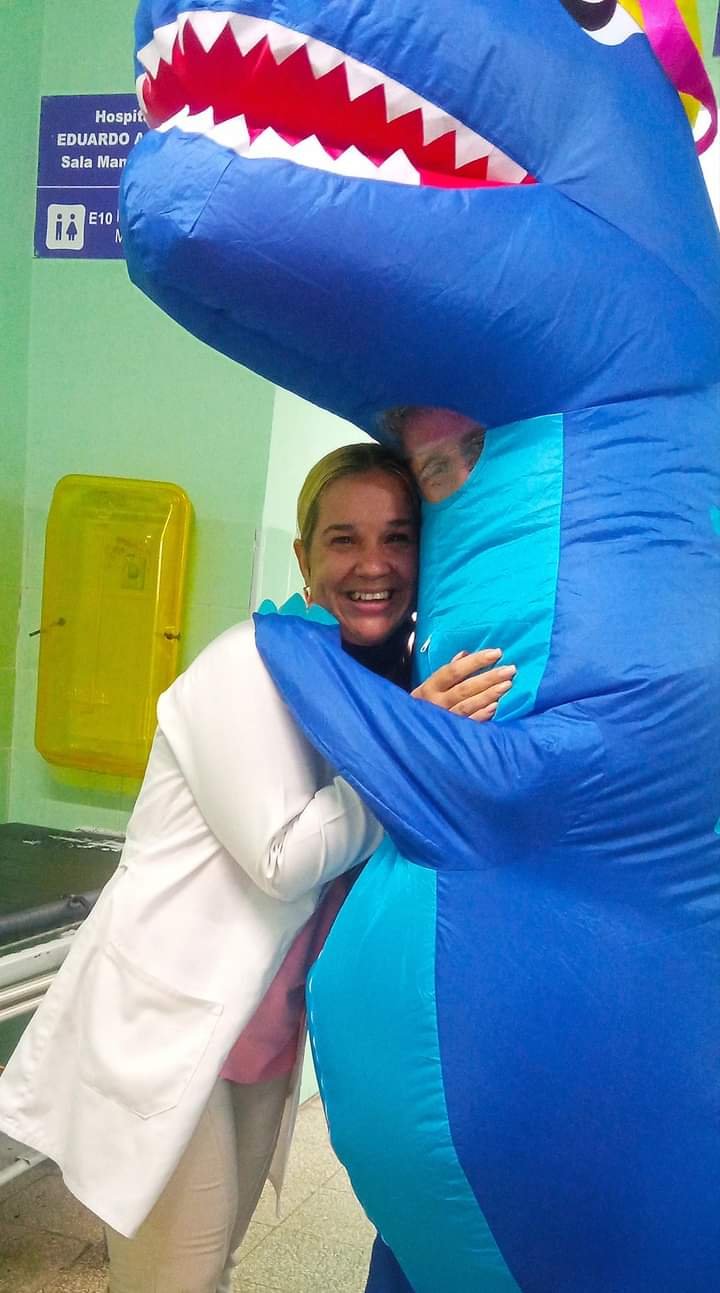
Jugar, además de beneficioso, es subversivo en un mundo obsesionado con la productividad. Permitirse rodar por el suelo o disfrazarse de payaso es un acto político. Es recordar que, bajo las capas de responsabilidades, seguimos siendo esos seres que creían que una caja de cartón podía ser un castillo.
Escribir poesía, para mí, siempre ha sido un juego. ¿No es acaso una metáfora un escondite lingüístico? ¿Y un haikú, un juego de equilibrar sílabas?
En el hospital, cuando veo a un adolescente jugando Candy Crush en su cama, me acerco y le pregunto si me deja pasar al siguiente nivel. Su sonrisa de incredulidad abre una grieta en la relación médico-paciente. Ya no soy la autoridad: soy su cómplice.
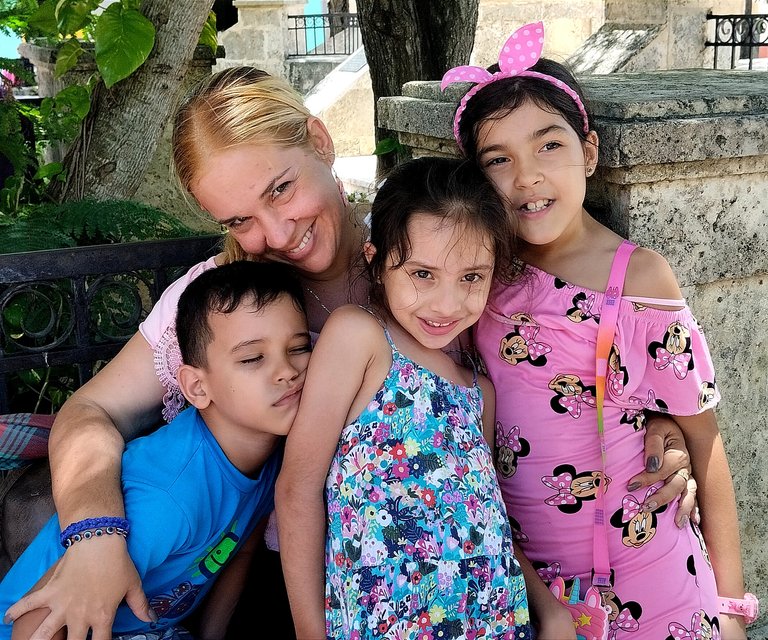
Lo he comprobado incontables veces: jugar desactiva miedos. Un niño que teme una punción lumbar acepta el procedimiento si antes practicamos con un muñeco; un niño que se intimida con una bata blanca y fría te dejará hacerle el examen físico más exhaustivo si le pides su juguete, si le preguntas su nombre y si inventas un juego casual. Aunque no me crean, esa es mi práctica diaria en una sala de neurología pediátrica.
Mi hija me dijo hace poco: "Mamá, ¿por qué los adultos dejan de jugar?" La respuesta es triste: porque nos han convencido de que la madurez es seriedad. Igual me pongo a pensar, y la poeta que vive en mí rebate que saltar es poesía en movimiento, mientras que mi otra mitad, la neuróloga, añade que jugar es también la sincronización de neurotransmisores.
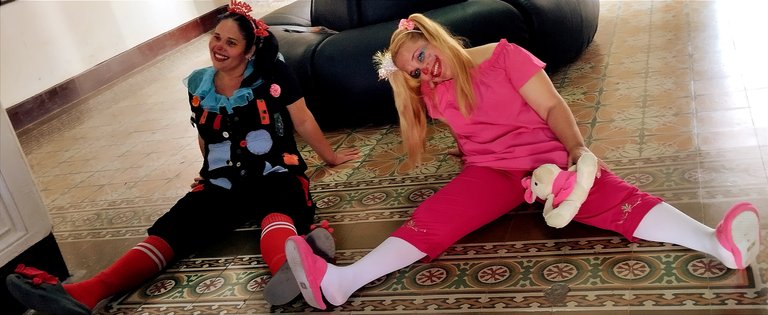
Las instantáneas que comparto aquí —deslizándome o vestida de payaso— no son solo un capricho. Son un recordatorio de que el juego es el antídoto contra la rigidez vital. Que en cada risa hay una descarga de dopamina, pero también un verso suelto del universo.
Ahora mismo me viene a la mente la frase de Friedrich Schiller, que nos recordó que "el hombre solo es completamente humano cuando juega".
Y como jugadora al fin, he llegado por la invitación de @marabuzal e invito a @marpasifico y @yuraimatc a mostrar que también en ellas vive un alma feliz que juega.

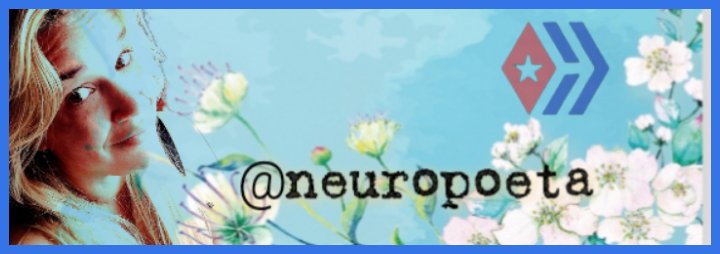
✨ ¡𝑮𝒓𝒂𝒄𝒊𝒂𝒔 𝒑𝒐𝒓 𝒍𝒆𝒆𝒓! ✨
𝑺𝒊 𝒂ú𝒏 𝒏𝒐 𝒎𝒆 𝒄𝒐𝒏𝒐𝒄𝒆𝒔: 𝒔𝒐𝒚 𝒏𝒆𝒖𝒓ó𝒍𝒐𝒈𝒂 𝒚 𝒆𝒔𝒄𝒓𝒊𝒕𝒐𝒓𝒂 𝒄𝒖𝒃𝒂𝒏𝒂, 𝒎𝒂𝒅𝒓𝒆, 𝒎𝒖𝒋𝒆𝒓 𝒚 𝒔𝒐ñ𝒂𝒅𝒐𝒓𝒂 𝒒𝒖𝒆 𝒆𝒏𝒄𝒐𝒏𝒕𝒓ó 𝒆𝒏 𝑯𝒊𝒗𝒆 𝒖𝒏 𝒉𝒆𝒓𝒎𝒐𝒔𝒐 𝒆𝒔𝒑𝒂𝒄𝒊𝒐 𝒑𝒂𝒓𝒂 𝒗𝒐𝒍𝒂𝒓.
𝑬𝒍 𝒕𝒆𝒙𝒕𝒐 𝒚 𝒍𝒂𝒔 𝒊𝒎á𝒈𝒆𝒏𝒆𝒔 𝒔𝒐𝒏 𝒅𝒆 𝒎𝒊 𝒂𝒖𝒕𝒐𝒓í𝒂, 100% 𝒉𝒖𝒎𝒂𝒏𝒐𝒔 (𝒔𝒊𝒏 𝑰𝑨).
𝑩𝒂𝒏𝒏𝒆𝒓 𝒅𝒊𝒔𝒆ñ𝒂𝒅𝒐 𝒑𝒐𝒓 𝑳𝒖𝒎𝒊𝒊.
¿𝑻𝒆 𝒈𝒖𝒔𝒕ó 𝒆𝒔𝒕𝒂 𝒑𝒖𝒃𝒍𝒊𝒄𝒂𝒄𝒊ó𝒏? 𝑽𝒐𝒕𝒂, 𝒄𝒐𝒎𝒆𝒏𝒕𝒂 𝒐 𝒓𝒆𝒃𝒍𝒐𝒈𝒖𝒆𝒂 𝒑𝒂𝒓𝒂 𝒂𝒚𝒖𝒅𝒂𝒓 𝒂 𝒅𝒆𝒔𝒑𝒍𝒆𝒈𝒂𝒓 𝒆𝒔𝒕𝒂𝒔 𝒂𝒍𝒂𝒔. 💛
ENGLISH VERSION
Adults Slide Too: Games, Neurons, and Metaphors
I climb onto the slide. Yes, me, with my neurologist coat still hanging from my shoulder, my verses piled up in the notebook in my pocket. The children’s surprised looks amuse me: Do adults slide too? As I glide down, for a second, I’m five years old again.

As a poet, I know that the most genuine metaphors are born from wonder, and as a neurologist, I’ve seen how play rewires brains: in the neuronal plasticity of my dementia patients who recover flashes of memory by squeezing a stuffed animal, or in the stroke survivor who plays with a rubber ball until regaining the desired muscle strength. I often see how children with autism find bridges to the world through play. And as a mother, I learn every day that my daughter teaches me more when we play than when I give her lessons.
In neurology, there’s a beautiful concept: cognitive reserve. The more flexible your brain is, the more it will resist the passage of time, and nothing trains that flexibility better than play. It’s no coincidence that studies show adults who maintain playful habits have a lower risk of depression or Alzheimer’s.

Playing, besides being beneficial, is subversive in a world obsessed with productivity. Allowing yourself to roll on the floor or dress up as a clown is a political act. It’s remembering that beneath the layers of responsibilities, we’re still those beings who believed a cardboard box could be a castle.
Writing poetry has always been a game for me. Isn’t a metaphor, after all, a game of linguistic hide-and-seek? And a haiku, a game of balancing syllables?
In the hospital, when I see a teenager playing Candy Crush in their bed, I approach and ask if they’ll let me pass the next level. Their incredulous smile cracks open the doctor-patient relationship. I’m no longer the authority—I’m their accomplice.

I’ve witnessed it countless times: play disarms fear. A child afraid of a lumbar puncture accepts the procedure if we first practice with a doll; a child intimidated by a cold white coat will let you perform the most thorough physical exam if you ask for their toy, if you ask their name, if you invent a casual game. Even if you don’t believe me, that’s my daily practice in a pediatric neurology ward.
My daughter asked me recently: "Mom, why do adults stop playing?" The answer is sad: because they’ve convinced us that maturity means seriousness. Then I start thinking, and the poet in me argues that jumping is poetry in motion, while my neurologist half adds that play is also the synchronization of neurotransmitters.

The snapshots I share here—sliding down or dressed as a clown—aren’t just whims. They’re a reminder that play is the antidote to life’s rigidity. That every laugh holds a dopamine rush, but also a loose verse from the universe.
Right now, Friedrich Schiller’s words come to mind, reminding us that "man is only fully human when he plays."
And as a true player, I’m here thanks to @marabuzal’s invitation, and I now invite @marpasifico and @yuraimatc to show that they too carry a joyful, playful spirit within.


✨ 𝑻𝒉𝒂𝒏𝒌𝒔 𝒇𝒐𝒓 𝒓𝒆𝒂𝒅𝒊𝒏𝒈! ✨
𝑰𝒇 𝒚𝒐𝒖 𝒅𝒐𝒏’𝒕 𝒌𝒏𝒐𝒘 𝒎𝒆 𝒚𝒆𝒕—𝑰’𝒎 𝒂 𝑪𝒖𝒃𝒂𝒏 𝒏𝒆𝒖𝒓𝒐𝒍𝒐𝒈𝒊𝒔𝒕 𝒂𝒏𝒅 𝒘𝒓𝒊𝒕𝒆𝒓, 𝒂 𝒎𝒐𝒕𝒉𝒆𝒓, 𝒂 𝒘𝒐𝒎𝒂𝒏, 𝒂𝒏𝒅 𝒂 𝒅𝒓𝒆𝒂𝒎𝒆𝒓 𝒘𝒉𝒐’𝒔 𝒇𝒐𝒖𝒏𝒅 𝒊𝒏 𝑯𝒊𝒗𝒆 𝒂 𝒃𝒆𝒂𝒖𝒕𝒊𝒇𝒖𝒍 𝒔𝒑𝒂𝒄𝒆 𝒕𝒐 𝒔𝒐𝒂𝒓.
𝑨𝒍𝒍 𝒕𝒆𝒙𝒕 𝒂𝒏𝒅 𝒊𝒎𝒂𝒈𝒆𝒔 𝒂𝒓𝒆 𝒎𝒚 𝒐𝒓𝒊𝒈𝒊𝒏𝒂𝒍 𝒄𝒓𝒆𝒂𝒕𝒊𝒐𝒏𝒔, 100% 𝒉𝒖𝒎𝒂𝒏-𝒎𝒂𝒅𝒆 (𝒏𝒐 𝑨𝑰).
𝑩𝒂𝒏𝒏𝒆𝒓 𝒅𝒆𝒔𝒊𝒈𝒏𝒆𝒅 𝒃𝒚 𝑳𝒖𝒎𝒊𝒊.
𝑳𝒐𝒗𝒆𝒅 𝒕𝒉𝒊𝒔 𝒑𝒐𝒔𝒕? 𝑼𝒑𝒗𝒐𝒕𝒆, 𝒄𝒐𝒎𝒎𝒆𝒏𝒕, 𝒐𝒓 𝒓𝒆𝒃𝒍𝒐𝒈 𝒕𝒐 𝒔𝒑𝒓𝒆𝒂𝒅 𝒕𝒉𝒆 𝒘𝒊𝒏𝒈𝒔 𝒐𝒇 𝒄𝒓𝒆𝒂𝒕𝒊𝒗𝒊𝒕𝒚! 💛
